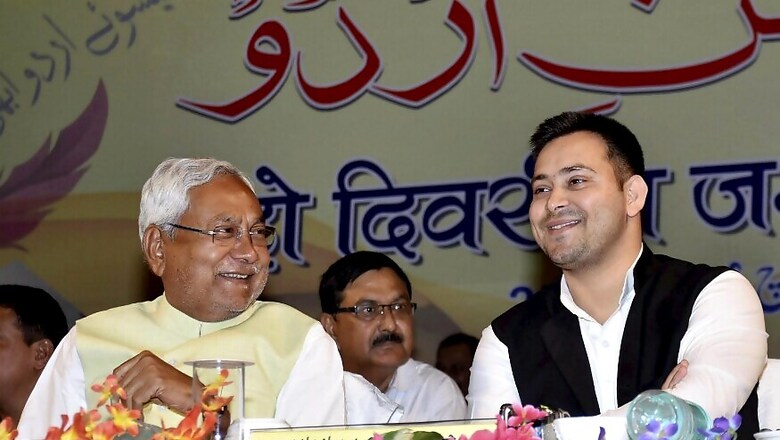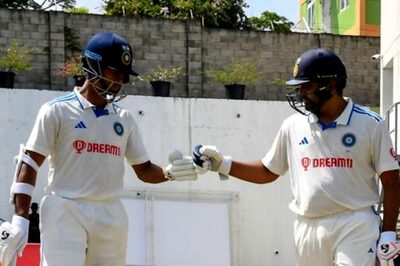
views
A few months later, Bihar will be in election mode. Political parties in the state will gear up gradually for the key poll battle. The Delhi election verdict this year, riots that followed soon after, the Covid-19 pandemic and the lockdown have made the task of the political parties in Bihar more challenging.
Handling of the outbreak and migrant crisis by the Bihar government is crucial as it can make or mar the political prospects of chief minister Nitish Kumar.
According to Afroz Alam, professor and head of the political science department at Maulana Azad National Urdu University: “Undoubtedly, the state's response to deal with the Covid-19 pandemic will be a primary factor in deciding the voting behaviour of the people in the soon-to-be-held elections. Bihar is not an exception. A perception has started building in Bihar that Nitish Kumar, despite having 15 years of chief ministerial experience and known for good governance, has failed to deliver what the other states have been able to achieve.
I am of the view that the popular approval rating of Kumar has gone down among the 2.5 crore workers/daily wage labourers stranded in other states out of which 2 crore live in rural areas. We must also remember that 34 per cent people of Bihar are living below the poverty line who are devoid of any assured income during this period.
In this context, the apathy of the Bihar government in addressing the concerns of migrants like arranging transport, fares and food to return to their homes and ensuring minimum social security may cost the government heavily. The pandemic has the potential to shift the electoral agenda towards governance issues like better healthcare system, employment, industrialisation, education and so on. We may witness a domino effect of already growing anger against the present regime in rural Bihar from where the workers were stuck in other states during the lockdown."
Both the key parties, ruling Janata Dal (United) and opposition Rashtriya Janata Dal (RJD), will try to put their best foot forward and evolve political strategies keeping in mind the mood of the people after the pandemic and the migrant exodus. The opposition would also try to build a political narrative based on how the situation was handled by Nitish Kumar.
Socially and politically the RJD and the Congress have made the right political pitch by offering to bear the burden of railway fares of the migrants. The move compelled the Nitish to announce that his government will take care of the migrants' fare. Many political analysts believe that the CM’s dilly-dallying attitude towards the return of students from Kota in Rajasthan and migrants travel by train may have damaged the political gains from the resolutions passed by him against the National Population Register (NPR) and National Register of Citizens (NRC).
The Bihar assembly had declared that there is no need for NRC in the state and NPR would be done as per the 2010 format. Many political analysts believe that by doing so Nitish Kumar had scored political points over the opposition.
On the one hand he tried to pacify the anger and apprehension of the anti-CAA, NRC and NPR protesters, and on the other he smartly seized the opportunity from opposition parties to attack him and reap political mileage out of it. Therefore, to connect with the youth, RJD leader Tejashwi Yadav pitched his election campaign through 'Berozgari Hatao Yatra' from Patna. The big question is, can Tejashwi match the political acumen of Nitish Kumar and stitch a formidable alliance against him in the absence of Lalu Prasad Yadav during the campaign trail.
"The impact of the Delhi verdict and the following riots will have a cascading effect on the forthcoming electoral competition in Bihar apart from the Covid-19 pandemic and migrant crisis. The defeat in Jharkhand and Delhi state elections will force the BJP-JD(U)-LJP alliance to renew its political synergy.
On the other hand, the dismal performance of the Congress in the Delhi elections is worrisome, and it is the RJD that needs to up the ante to stitch a formidable alliance. The election would be a mix of governance assessment and polarisation of votes on religious lines," says Praveen Rai, academic secretary, Centre for the Study of Developing Societies (CSDS).
Initially the opposition was groping in the dark to come with the political narrative that can help it attract the masses and galvanise the cadres on the ground. The migrant crisis and ineffective handling by the state machinery seems to have provided the kind of political narrative the opposition was looking for.
Tejashwi Yadav has made the right move while trying to tap the anger of the youth of the state and it would be interesting to see if he can fine-tune rapport with young people or outsmart Nitish in social engineering under the guidance of his father Lalu Prasad. In politics, opportunities keep on rotating from time to time and the party that is smart enough and can adjust to the required political aspiration and demand of the people will surely have an edge. The changing idiom of politics does strike a chord, which is evident from the Delhi elections.
(The author is a freelance journalist. Views expressed are personal.)




















Comments
0 comment